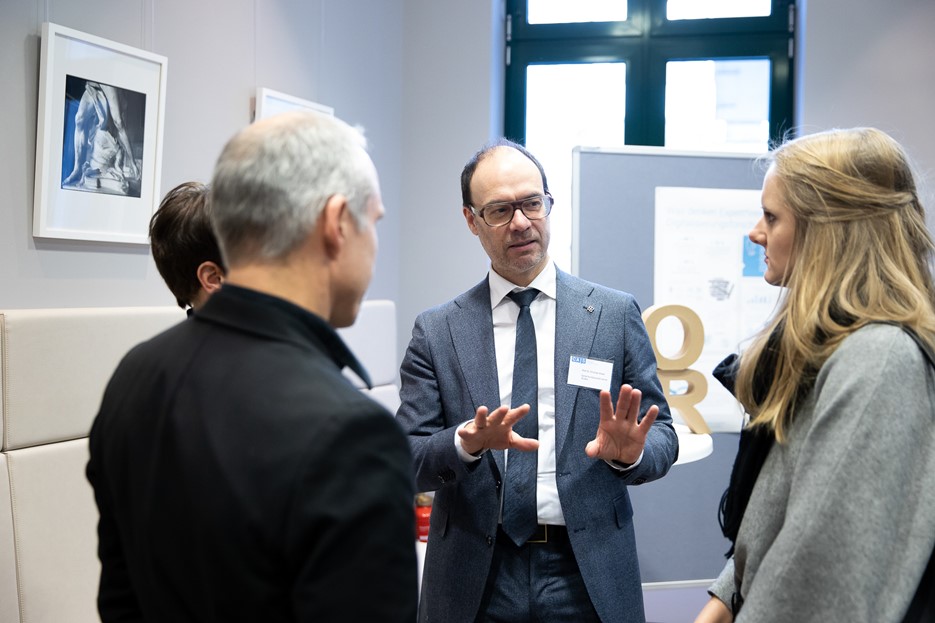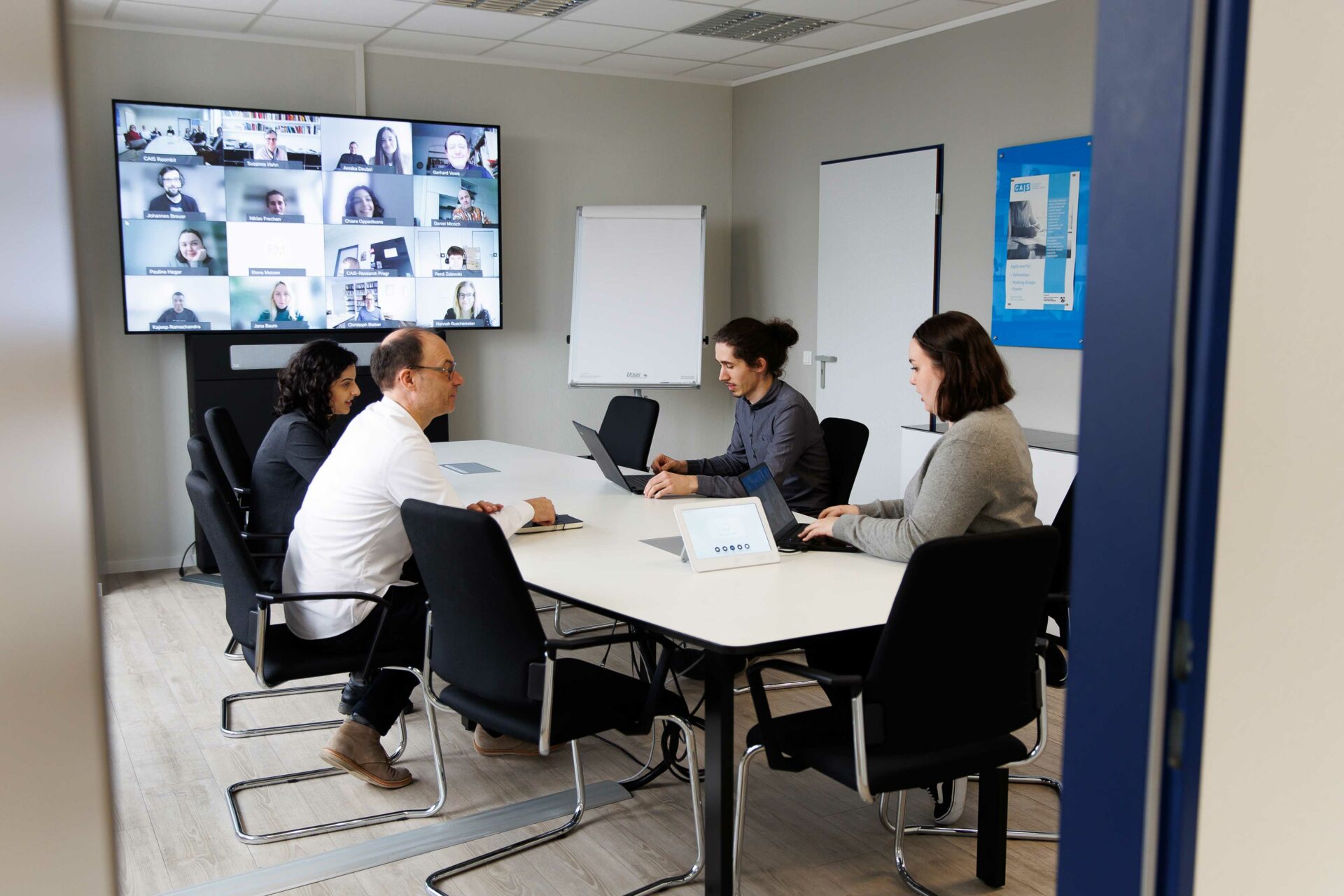Research program: DDI – Digital democratic innovations

With his team, Prof. Christoph Bieber will research how democracy changes in a digital society and how it can be promoted through digitization. The empirical focus of the program is on the development and use of online voting and elections. In a second empirical topic, the researchers are looking at the political and social effects of smart city projects.

In two interdisciplinary working groups, the program will be developed in agile, flexible team constellations and implemented with innovative tools. The program is committed to an open understanding of science and will contribute to the development of innovations for the common good in the sense of application-oriented research with the help of a real laboratory.
“We currently see that digital tools can give a voice to people who are otherwise not heard. Nevertheless, the concerns of many people are left out of modern negotiation processes because of a lack of access or competencies. Under what conditions digital innovations can strengthen the common good in democratic processes is our focus.”
Prof. Christoph Bieber
Head of the research program
“Digital Democratic Innovations
How are political decision-making and social participation changing under the conditions of digitalization?
In the Corona pandemic, the influence of technological possibilities on social negotiation processes received a renewed boost. Contact bans have made political gatherings such as party conventions and protest rallies more difficult or shifted them entirely to digital spaces, the preparation of decisions has often taken place via video conferencing, and decision-making has also been implemented with digital tools. These developments are not new: Participation in the political process and the production of binding decisions are changing with the technologies available for this purpose.
Data-oriented state and digital civil society
The concrete starting point for the development of the research program is a dynamic interrelationship: Under the conditions of digitization, an increasingly data-oriented state is forming, which is developing new activities and routines. Opposed to this is a digital civil society, which for its part is driving forward citizen-centered technology development and its use in order to secure self-determination and participation for a sovereign network citizenry. This field of tension is connected by a digital infrastructure – partly public, partly private – in which a multitude of media and market players meet in fragmented, networked public spheres. This reveals the always ambivalent contours of a digital innovation landscape that encompasses a broad spectrum of fields of inquiry: Centralized data repositories in state hands offer the opportunity for a forward-looking provision of public services, but also harbor the danger of misuse and manipulation. Digital platforms express hitherto non-publicly audible positions, but can also promote social polarization. A “smart city” opens up new options for urban life and intelligent mobility, but can always also be understood as a surveillance apparatus. And: Many people are denied participation in such modern negotiation processes because they lack access, media knowledge and competence. Against this background, the research program will investigate democratic innovations that emerge through the use of data, algorithms and digital practices.
Policy change, public good technology and digital ethics
Addressing this question succeeds by focusing on several objectives:
- First, a more precise knowledge of the effect of digital decisions on political organizations and processes is to be obtained. This is linked to a theoretical contribution to the changes in the form of democratic-representative politics in the digital constellation.
- Second, it is important to identify spaces and tools that unfold potentials for new forms of digital participation and public good-oriented technology use.
- Third, the dynamics between the data-rich state and digital civil society can be captured – a normative perspective formulates considerations on the politics of the data-oriented society in the sense of digital ethics.
Research question
How are political decision-making and social participation changing under the conditions of digitalization?
News
Digital council systems: News from the lowlands of digitalisation
A survey of the use of digital council information systems (DRS) in the municipalities of North Rhine-Westphalia.
AIT’s Forum on the Histories of the Internet.
A talk at the AIT’s Forum about “The Internet of Things: Co-production for Inclusive Smart Cities.”
Christoph Bieber on smart cities
Sensors and technology will ensure that more and more data is collected in cities.
Introduction to ethics. Basic models of ethics.
On 20 December 2023, Jana Baum will hold a seminar session on “Introduction to ethics. Basic models of ethics.” will lead.
AI improves society?!
Christoph Bieber is organising a workshop on “Digital Ethics” during a conference on 18 and 19 January at the Academy for Political Education in Tutzing.
What impact will AI have on the super election year?
Christoph Bieber talks about the upcoming super election year 2024 and the influence of artificial intelligence in the Tagesschau article.
Second special issue of the transfer journal easy_social_sciences published
The second special issue of the transfer journal easy_social_sciences in collaboration with Julian Kohne (GESIS) and Johannes Breuer has been published.
Contribution to the anthology “Elections are also just an algorithm”
Anne Goldmann and Christoph Bieber with a contribution to the anthology “Regieren in der Transformationsgesellschaft” on the topic of elections and algorithms.
Update: Smart City Summit Lower Rhine
Christoph Bieber takes part in the Smart City Summit on the Lower Rhine. The date for this has been postponed from November 2023 to February...
Workshop: The future of democracy
From 13 to 14 November, Christoph Bieber will be taking part in the Future of Democracy workshop in Barcelona (the current European Capital of Democracy).
Lectureship Media Research at the TU Dresden
At the TU Dresden, Pauline Heger holds a lectureship in the Media Research degree programme.
Accompanying learning paths (digitally): Intelligent Tutorial Systems
With a blog post at the Lamarr Institute, Ann-Christin Falhs, Astrid Wichmann and Nikol Rummel work in cooperation.
Inter-University Young Researchers Conference Stuttgart
Jana Baum will give a lecture on 1 October on the question of the extent to which artificial intelligence can possess theoretical knowledge, using the...
Podcast Episode “Digital Sensemaker”
For the 100th podcast episode, Anne Goldmann was a guest on “Digital Sensemaker” to talk about AI and politics.
Hybrid Smartness
In this latest book chapter co-authored by Mennatullah Hendawy, the idea of smart cities is explored though different approaches of Top-Down and Bottom-Up.
(Digital) life is a construction site.
Christoph Bieber contributes with a journal article in a special issue of “Digitalisation and Political Education”.
Data for the smart city and you’re up and running: Is it really that simple?
Whether it’s traffic management or improving the climate – data makes many things seem controllable in a smart city. We discuss the challenges for smart...
Unity & Primordiality of Reason
Jana Baum will give a lecture at the University of Leipzig in connection with the workshop “Author Meets Critics” with Lea Ypi.
Conference Presentation at the ICPP6
Jana Baum and Anne Goldmann will attend the ICPP6 to talk about their paper they worked on with Mennatullah Hendawy.
Keynote speech on the situation of board supervision in Germany
Christoph Bieber gives a keynote speech at a conference on the independence of the ORF in Vienna at the Presseclub Concordia.
Rationality Models in Classical German Philosophy
Jana Baum attends a workshop in the Italian city of Padua on the topic of rationality models as part of the Arqus network.
Informative cartographic communication
Mennatullah Hendawy published a latest journal article with Ahmed Atia on COVID-19 and the geovisualization.
meine.deine.unsere.werte – Student Competition organized by Ruhr University Bochum (Professional School of Education)
On the 19th of June Christoph Bieber will be jury member at the reward ceremony for meine.deine.unsere.werte.
Seminar: Technology & Media Ethics at HdM, Stuttgart
From April to July 2023 students can take part in the seminar “Technology & Media” by Christoph Bieber.
The future of public service broadcasting
On 20.04.2023 Christoph Bieber will answer questions on the topic of “The Future of Public Service Broadcasting” in the NRW Parliament.
The mAI at CAIS: Get to know our AI research
May 2023 will be AI Month across Germany. On 17 May 2023, we will provide three key insights into our AI research.
“The main thing is digitalisation?”
Anne Goldmann with her contribution: “Hauptsache Digitalisierung? Zur Positionierung der Parteien im Bereich Digitalpolitik im Vorfeld der Bundestagswahl 2021” is now available.
White Paper: AI & Journalism
In the white paper on AI and journalism, Christoph Bieber contributes as co-author to the “Lernende Systeme” Platform.
Transformation of political participation
On 19 January 2023, Anne Goldmann, Pauline Heger & Christoph Bieber participated in a session of the seminar “Transformation of Political Participation” at the NRW...
“Failed yet successful: Learning from discontinued civic tech initiatives”
As part of the CHI23 conference, Mennatullah Hendawy and Christoph Bieber are participating in the implementation of a workshop. A request for participation came from...
“Introduction to Ethics. Basic Models of Ethics”
As part of the seminar “Transparency, Ethics and the Public Sphere in (Digital) Democracy”, led by Anne Goldmann at the University of Duisburg/Essen, Jana Baum...
“Ryle on voluntary actions”
From 3 to 5 November 2022, the conference “The End of Autonomy?” took place at the Bratislava International School of Liberal Arts (BISLA). On this...
“Germany one year after the Bundestag election”
In this interdisciplinary event, German and international journalists and academics will deal with the populist influence on democratic processes: be it through various forms of...
“Quakes in the system: the reform of public service broadcasting”
Better control and more transparency: After the revelations at rbb, public broadcasting has come under massive criticism. Calls for a reform of the control structure...
“Digitalisation policy”
WDR 3 Forum is the authoritative platform for current cultural and socio-political issues. Be there live when controversial opinions meet. With their different perspectives and...
“The Role of AI in the Electoral Process”
A short presentation (“intervention”) on the role of AI systems in the electoral process. Central questions/theses: Modernising elections with computer technology is already difficult enough...
Journal article “AI Policy in Germany”
A new peer review article was published in the dms Special Issue on “Policy Change and Stability” with the title:“Technological Change Meets Policy Field Change:...
“I’m a Scientist. Get me out of here.”
For the theme week of “I’m a Scientist. Get me out of here.”, Anne Goldmann will be answering pupils’ questions on the topic of artificial...
Co-creative research practice at CAIS
On 23.09.2022 the conference: Exploring Socio-Technical Research – A Multi-Method Transdisciplinary Workshop at TU Dresden. For this, Samuel Simon, Josephine Schmitt and Christoph Bieber will...
The Team







